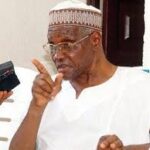One of the advantages of these days of lockdown is the ample time at our disposal to catch up on outstanding readings.
With daily travels restricted to warming the car to the nearby groceries and pharmacists one is left with endless hours to fill in with whatever activity. Fortunately, I had as one of my pending readings a copy of the autobiography of Justice James Ogebe who retired exactly a decade ago from the Supreme Court. The book which came out under the title of ‘Justice Under the Shadow of the Almighty, My Life – Sojourn to the Nigerian Supreme Court’, makes for very engaging reading.
I had the privilege of meeting the jurist some months ago when I accompanied Professor A. D. Yahaya, his classmate at Government College Keffi (1955-62) and long-time family friend to visit him at his austere residence in his Asokoro hilltop home. The visit was I guessed to reminisce and chat about the times they have been through. That was where I had inkling of the launching of the biography. However, when the launch came to be I was out of Abuja and could therefore not attend. He had a well-attended launching on the 21st March 2020.
The book has long been in the works and Justice Ogebe was delighted to accomplish the task. He launched it on that particular date because it coincided with his 80th birthday and this year would also be the 50th wedding anniversary to his wife, Dr Mary Ogebe. It was a double whammy, as our elder in this fraternity, Dan Agbese, called it in an earlier piece. As the Justice promised in the first few pages of the book, the narration was not purely ‘legal’ or ‘personal’. He said: ‘It is a mix of both facets of my life so that the reader is exposed to all of yours truly, just as I am’.
The book essentially chronicles his journey of life from the Idoma village of Igumale to several other places that he never imagined as a child. Igumale is today the headquarters of Ado Local Government Area of Benue State, but then in 1940, when James Ogebe was born, it was just a rustic backwater. He had his elementary education there. He lost his mother at an early age due perhaps to spousal abuse as he related. He said: ‘Ironically in the future, despite being a collateral victim of a heinous crime, much of my career would be bringing people to justice’. He was fortunate to have a caring grandmother who stood in solidly for him. The first sign that life was going to be different for him was the opportunity he got in 1954 when he was admitted to Benue Middle School, Katsina-Ala. The following year he sat for common entrance for all Northern Nigerian students and emerging as one of the best in Benue Province got admitted into Government College, Keffi. The college, along with Government College Zaria (now Barewa College) and Queen Elizabeth Ilorin were the only government secondary schools in Northern Nigeria at that time. They picked as students only the most outstanding candidates from the provinces.
He relished the time he spent in Keffi. He found a school that was run like the best British public schools of the times. Most of the teachers were British and the standard of teaching and discipline was very high. It afforded him with an opportunity to mix with students from other parts of the north thus broadening his worldly outlook. It was in Keffi that Justice Ogebe honed his leadership qualities. He took his responsibilities seriously both as a student and a leader among boys culminating in becoming the college head boy in 1962 as well being elected president of the debating society – a position that would prepare him for his future career.
He got into the newly established Ahmadu Bello University (ABU) in 1963 and the following year landed at the Faculty of Law in the Kongo Campus. He recalled that the LLB class had only 21 students. All the lecturers were British and could give undivided individual attention to the students due to their small number. The conditions were top of the range and simply conducive for learning. He was deliberately studious and did not allow his attention to be diverted into participation in students’ politics, though he was once appointed the chief electoral officer to conduct elections for the students union, which he considered a foretaste of things to come.
The year of his graduation 1967 coincided with the beginning of the Nigerian Civil War. At the Nigerian Law School (NLS) in Lagos, which he attended from October that year, he found himself among only 120 students, a number that was rather short of those from the East who could not attend due to the war. He noted that their absence during those years of the civil war had significant impact in subsequent years on the representation of the south-easterners at senior levels in the Judiciary. At their graduation in 1968, they were specially enrolled into the Nigerian Bar by the first indigenous Chief Justice of Nigeria, Sir Adetokunbo Ademola.
The set of NLS 1968 would arguably be the most influential set ever on our judicial system and the country at large, in their many years post-call. A good number of them went into the public service as pupil state counsels or associate magistrates particularly those from the north. Over the years, the set would produce Solicitors General, Directors of Public Prosecution, Chief Registrars, State Attorneys General and High Court Judges. Eight of the set were elevated to the Court of Appeal and four rose to the Supreme Court. Though there are none of them on the bench now, it is etched in the annals that they are the only set that produced two Chief Justices of Nigeria (CJN), Aloysius Katsina-Alu and Dahiru Mustapher and two Presidents of the Courts of Appeal (PCA), Umaru Abdullahi and Ayo Salami and in fact, both concurrently.
In spite of these outstanding performance in the Nigerian Judiciary, the set had a collective dent when two of their own, Chief Justice Aloysius Katsina-Alu and President of the Court Appeal Ayo Salami, had a public disagreement over a governorship appeal in Sokoto State. This escalated into a national issue leading to the untimely retirement of Justice Ayo Salami. In an unprecedented move they sued each other in court and appeared before investigation panels headed by another set ‘68 member wherein another ‘68 member testified as a witness. Though Justice Ayo Salami was eventually recalled, eight months down the line, the bitterness and bickering did not lapse until Katsina-Alu went to his grave.
Justice Ogebe started his career in the Benue Plateau State Judiary as a Pupil State Counsel. He had a tumoultous career, which later took him to Benue State where he reported that he was twice passed over for the post of Chief Judge because, as he believes, he did not come from the majority ethnic group. Eventually, the rejected stone in Benue State made it to the Court of Appeal. He could have retired there too, but for the decision of his colleague, PCA Ayo Salami’s refusal to go to the Supreme Court. As they were from the same zone Justice Ogebe was promoted to the Supreme Court to fill the vacancy.
Justice Ogebe is a man of strongly held views and is never afraid to expressed them. This is evident in many parts of the book. For example, he believes that the federal character consideration has done incalculable damage to the quality of justices appointed to the Supreme Court. We will return to this and other issues next week. Keep a date with this page.
 Join Daily Trust WhatsApp Community For Quick Access To News and Happenings Around You.
Join Daily Trust WhatsApp Community For Quick Access To News and Happenings Around You.


